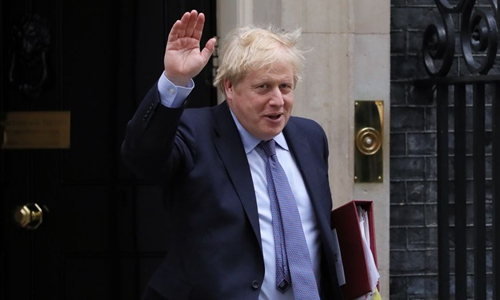
British Prime Minster Boris Johnson leaves 10 Downing Street for Prime Minister's Questions, in London, Britain, Feb. 26, 2020.(Photo by Tim Ireland/Xinhua)
As the British government relaxed pandemic restrictions in daily life in England on Monday dubbed "Freedom Day" by the local media," the once empire on which the sun never sets is risking turning into "a country in which the coronavirus never subsides."
UK Prime Minister Boris Johnson admitted the reopening would mean resigning the UK "sadly to more deaths from COVID," but he added, "if we can't reopen our society in the next few weeks, when we will be helped by the arrival of summer and by the school holidays, then we must ask ourselves when will we be able to return to normal?"
However, the question is whether the easing of the lockdown limitations will truly return the UK to normalcy. More than 1,200 scientists signed a statement released in The Lancet earlier this month warning the UK government against lifting all restrictions in the wake of the worrying third COVID-19 wave. They called the decision "dangerous and unethical." Professor Neil Ferguson, a former key UK government adviser warned UK's COVID-19 infections would "almost certainly" reach 100,000 daily cases, with the potential to double that figure. How can such a potentially grim situation be described as "a return to normal?"
"The reopening fully demonstrates the short-sightedness and a gamble mindset of UK politicians," Gao Jian, secretary general of the Shanghai Academy of Global Governance and Area Studies at Shanghai International Studies University, told the Global Times.
The UK government is currently under significant economic pressure. Its GDP suffered an 11 percent decline. If economic woes cannot be alleviated in 2021, the pressure on the Johnson government will be unprecedented. Gao noted that the UK now has one of the highest COVID-19 vaccination rates in the world - The UK government decided to take a gamble partly because England has vaccinated 87 percent of those aged 18 and over with at least one dose, which many think will lead to fewer deaths. "This is typically a kind of opportunism," Gao said, noting some politicians in the UK are unable to take the country's long-term interests into consideration when making decisions, and are only concerned with their votes.
All countries have had to make a difficult choice since the outbreak: economy or people's lives? The approach adopted by many Western countries has showed clearly how they have put economic and political interests over the lives of people. China's anti-epidemic experiences have proven that the implementation of strict COVID-19 restrictions is effective in taming the virus. China decisively put Wuhan on lockdown for 76 days after the initial outbreak of the epidemic, curbing the spread of the virus at the cost of huge economic losses, which fully indicates China's human rights view that life is above all, as well as China's institutional advantages. This action is unmatched by the West.
Western countries are not able to pursue long-term national interests in governing due to the Western system of party politics, which prioritizes short-term political interests. The Western countries' frail governance and organizational capabilities have been laid bare by the COVID-19. Now most of those countries are pinning their hopes on vaccines. However at this stage, scientists generally believe that solely relying on vaccines is far from enough to defeat the virus.
COVID-19 restrictions have been lifted in England, but it's very likely they will be re-imposed again soon. As scientists have warned, the UK's policies will certainly represent a threat to the entire world during this period, as it will provide the ideal breeding ground for vaccine-resistant variants. The UK has become a stumbling block in the global pandemic fight.
The author is a reporter with the Global Times. opinion@globaltimes.com.cn




